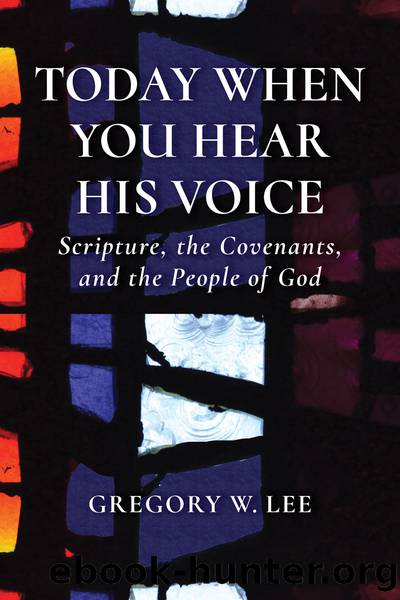Today When You Hear His Voice by Lee Gregory W.;

Author:Lee, Gregory W.;
Language: eng
Format: epub
Publisher: Wm. B. Eerdmans Publishing Co.
Published: 2016-05-11T17:16:09+00:00
The Epistle to the Hebrews
The engagement with Ps. 110 in Hebrews is pervasive and unique.73 Citations or allusions to Ps. 110:1 appear throughout the epistle at significant junctures in the text: the exordium (1:3-4), the concluding verse of the subsequent scriptural catena (1:13), two important summary passages (8:1 and 10:12-13), and the climactic exhortation of 12:2.74 The epistleâs application of this verse to Jesus is not itself unusual: the New Testament witnesses indicate the psalm was understood messianically from a very early juncture,75 and the gospels attribute this tradition to Jesus himself.76 What makes the contribution in Hebrews distinct is the affirmation of a new priesthood through Ps. 110:4, first cited in 5:6, alluded to in 5:10 and 6:20, and discussed at length in Heb. 7, with two citations at 7:17 and 7:21.77 Since the addressee of Ps. 110:1 is easily identified with Jesus, it makes natural sense that Ps. 110:4 also be understood in this regard. If Jesus is the exalted Lord, he must be priest forever, too, after the order of Melchizedek.
The treatment of Melchizedek in Hebrews has attracted a fair amount of scholarly discussion and debate, especially concerning the relation between Hebrews and other Jewish traditions.78 For our purposes, the following (relatively non-Âcontroversial) points bear mentioning. First, the interest in Melchizedek displayed by the author of Hebrews does not arise in a vacuum. Though Melchizedek appears at only two points in the Old Testament (Gen. 14:18-20 and Ps. 110:4), he attracts a wide range of attention in Second Temple Jewish literature: Jubilees, 1 Maccabees, the Assumption of Moses, various Targumim, Josephus, and Philo, as well as the oft-Âdiscussed Melchizedek Scroll from Qumran (11QMelch). Second, the epistleâs appropriation of Melchizedek is quite distinct from the kind of allegorical speculation found in Philo.79 While Philo does preÂsent Melchizedek as a historical human figure, his chief concern is to depict Melchizedek as the eternal Logos. Melchizedekâs identity as âking of righteousnessâ and âking of peace,â for instance, means that reason is a good pilot for the proper conduct of life, able to bring order to unruly passions.80 Reason brings forth âfoodâ full of cheerfulness and joy, and âwineâ to intoxicate the soul with sober virtue. The treatment of Melchizedek in Hebrews is, by contrast, thoroughly Christological and historical in orientation. Third, whether or not 11QMelch influenced Hebrews, there are significant differences between the two in their depictions of Melchizedek.81 The Qumran community seems to have identified Melchizedek with the archangel Michael as a kind of heavenly redeemer-Âwarrior figure, who with the assistance of other angels will bring judgment upon the wicked and salvation for Godâs elect. Hebrews treats Melchizedek as a prefigurement of Christ, not the actual agent of eschatological deliverance,82 and repeatedly stresses Christâs superiority over the angels. The Qumran scroll also reveals little interest in Gen. 14:18-20 and Ps. 110:4, the chief foci of the epistleâs attention.83
These observations illuminate the kind of scriptural reasoning exhibited in Heb. 7, the entirety of which may be understood as a reflection upon Ps.
Download
This site does not store any files on its server. We only index and link to content provided by other sites. Please contact the content providers to delete copyright contents if any and email us, we'll remove relevant links or contents immediately.
| Exegesis & Hermeneutics | New Testament |
| Old Testament |
The Five People You Meet in Heaven by Mitch Albom(3569)
The Secret Power of Speaking God's Word by Joyce Meyer(3220)
Real Sex by Lauren F. Winner(3023)
Name Book, The: Over 10,000 Names--Their Meanings, Origins, and Spiritual Significance by Astoria Dorothy(2987)
The Holy Spirit by Billy Graham(2953)
0041152001443424520 .pdf by Unknown(2846)
How The Mind Works by Steven Pinker(2816)
ESV Study Bible by Crossway(2778)
Ancient Worlds by Michael Scott(2688)
Churchill by Paul Johnson(2587)
The Meaning of the Library by unknow(2572)
The ESV Study Bible by Crossway Bibles(2551)
The Gnostic Gospels by Pagels Elaine(2531)
MOSES THE EGYPTIAN by Jan Assmann(2417)
Jesus by Paul Johnson(2363)
City of Stairs by Robert Jackson Bennett(2354)
The Complete Dead Sea Scrolls in English (7th Edition) (Penguin Classics) by Geza Vermes(2283)
The Nativity by Geza Vermes(2233)
Ancient Near Eastern Thought and the Old Testament by John H. Walton(2226)
